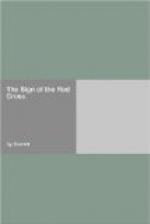Very sad indeed were these poor creatures at being, as it were, sent back to their death. For it began to be rumoured all about the city that not a living creature would escape who remained there. It was said that God’s judgments had gone forth, and that the whole place would be given over to destruction, even as Sodom, and that none who remained in it would be left alive.
This sort of talk made the brothers very anxious and sorrowful, but, as Joseph sought to remind his brother, the people who said these things had nothing better to go by than the prognostications of old women or quacks and astrologers, whom their father had taught them to disbelieve. He had always taught them that God alone knew the future and the thing that He would do, and that it was folly and presumption on the part of man to seek to penetrate His counsels, and venture to prophesy things which He had not revealed. So they plucked up heart, these two youthful wayfarers, firmly believing that God would take care of their father and all those who were working in the cause of mercy and charity in the great city, and that they could leave the issues of these things in His hands.
Since the day was very hot, and they were somewhat weary with their long walk and short night, they lay down at noontide in a little wood, not more than three miles from their aunt’s house in Islington, and there they slept again, with Fido at their feet, until the sun was far in the west, and they were ready to finish their journey in the cool freshness of the evening.
They had come by no means the nearest way, but had fetched a wide circuit, so as to avoid, as far as possible, all regions of outlying houses. Time was no particular object to them, so that they reached their destination by nightfall; and now they were quite in the open country, and delighting in the pure air and the rural sights and sounds.
Yet even here all was not so happy and smiling as appeared from the face of nature. The corn was standing ripe for the sickle, but in too many districts there were not hands enough to reap it. One beautiful field of wheat which the brothers passed was shedding the golden grain from the ripened ears, and flocks of birds were gathering it up. When they passed the farmstead they saw the reason for this. Not a sign of life was there about the place. No cattle lowed, no dog barked; and an old crone who sat by the wayside with a bundle of ripe ears in her lap shook her head as she saw the wondering faces of the boys, and said:
“All dead and gone! all dead and gone! Alive one day—dead the next! The plague carried them off, every one of them, harvest hands and all. They say it was the men who came to cut the corn that brought it. But who can tell? They got yon field in”—pointing to one where the golden stubble was to be seen short and compact—“but half were dead ere ever it was down; and then the sickness fell upon the house, and of those who did not fly not one remains. Lord have mercy upon us! We be all dead men if He come not to our aid. Who knows whose turn may come next?”




